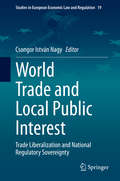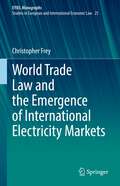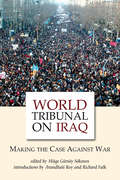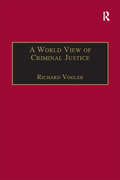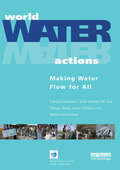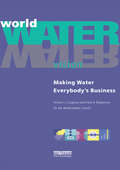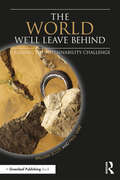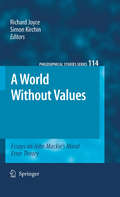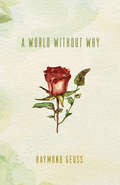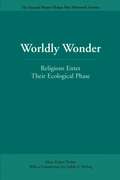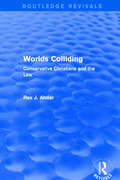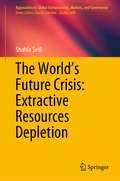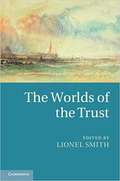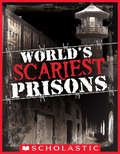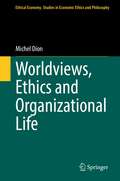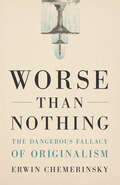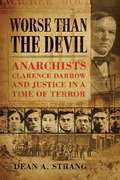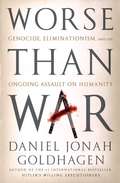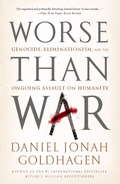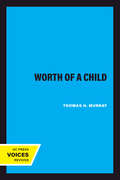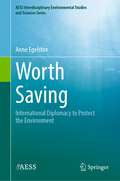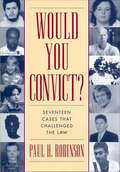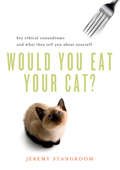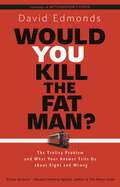- Table View
- List View
World Trade and Local Public Interest: Trade Liberalization and National Regulatory Sovereignty (Studies in European Economic Law and Regulation #19)
by Csongor István NagyTrade liberalization has shaped international economic relations since the conclusion of the GATT 1947. The last few decades have seen a significant shift in the focus of this process: multilateralism seems to have reached its limits, giving way to regionalism, and the focus of trade liberalization has shifted to non-tariff barriers. While these developments have attracted considerable attention, exploring them from comparative perspectives has been largely neglected. Trading systems – the WTO, regional economic integrations and federal systems – are all based on the same dichotomy of free trade and local public interest: they generally prohibit the constituent parties (states) from restricting trade, but exempt them from this limitation if the restriction is warranted by a legitimate local end. The purpose of this volume is to contribute to filling the above-mentioned research gap by exploring central issues in regional economic integrations from a comparative perspective. It provides a general economic analysis of the costs and benefits of trade liberalization and the role and function of normative values in commercial policy. This is followed by a comparative analysis of the approaches used in various regional economic integrations (in North America, Europe and Latin America) and federal markets (the United States, Australia and India) regarding the balance between free trade and local public interest. Key issues in investment law, one of the most contentious elements of next-generation free trade agreements, are also addressed.
World Trade Law and the Emergence of International Electricity Markets (European Yearbook of International Economic Law #25)
by Christopher FreyThe expansion of cross-border power transmission infrastructures and the regional integration of electricity markets are accelerating on several continents. The internationalization of trade in electric energy is embedded in an even greater transformation: the transition from fossil fuels to renewable energies and the race to net zero emissions. Against this backdrop, this book provides a comprehensive examination of the regulatory framework that governs the established and newly emerging electricity trading relations. Taking the technical and economic foundations as a starting point and thoroughly examining current developments on four continents, the book provides a global perspective on the state of the art in electricity market integration. in doing so, it focuses on the most relevant issues including transit of electricity, quantitative restrictions, market foreclosure and anti-competitive practices employed by the actors on electricity markets. In turn, the book carefully analyzes the regulatory framework provided by the WTO Agreements, the Energy Charter Treaty and other relevant preferential trade agreements. In its closing section, it moves beyond the applicable legal architecture to make concrete proposals on the future design of global trade rules specifically tailored to the electricity sector, which could provide a more reliable and transparent framework for the multilateral regulation of electricity trade.
World Tribunal on Iraq: Making the Case Against War
by Müge Gürsoy SökmenThe World Tribunal on Iraq (WTI) was a collective effort involving hundreds of people from all over the world, most of them never having met in person. Inspired by the Bertrand Russell Tribunal of the Vietnam War era, WTI aimed to record not only the crimes against the Iraqi people, but also crimes committed against humanity. With contributions from over fifty internationally renowned experts, World Tribunal on Iraq examines every aspect of the war, from its legality, to the history of US and British military interventions in Iraq, to the role of international institutions and corporations in the occupation, to the use of torture, and to strategies of resistance.
A World View of Criminal Justice (International and Comparative Criminal Justice)
by Richard VoglerCriminal justice procedure is the bedrock of human rights. Surprisingly, however, in an era of unprecedented change in criminal justice around the world, it is often dismissed as technical and unimportant. This failure to take procedure seriously has a terrible cost, allowing reform to be driven by purely pragmatic considerations, cost-cutting or foreign influence. Current US political domination, for example, has produced a historic and global shift towards more adversarial procedure, which is widely misunderstood and inconsistently implemented. This book addresses such issues by bringing together a huge range of historical and contemporary research on criminal justice in Europe, Asia, Africa, Australasia and the Americas. It proposes a theory of procedure derived from the three great international trial modes of 'inquisitorial justice', 'adversarial justice' and 'popular justice'. This approach opens up the possibility of assessing criminal justice from a more objective standpoint, as well as providing a sourcebook for comparative study and practical reform around the world.
World Water Actions: Making Water Flow for All
by Francois GuerquinThis text is divided into three parts. Part I focuses on the need for management to assess the challenges of water scarcity and plan changes based on proper valuation and financial instruments, international co-operation and efficient use. Part II analyses the problems of water scarcity and the available solutions in each main sector: water supply and sanitation, energy, health, agriculture, ecosystems and biodiversity. Part III assesses the state of the debate following the third World Water Forum and sets out the priorities for action, including increased investment, institutional reform and capacity building in the water sector. Downloadable resources with extensive case studies and statistical data accompanies this text.
World Water Vision: Making Water Everybody's Business
by William J. Cosgrove Frank R. RijsbermanMore than a billion people cannot get safe drinking water; half the world's population does not have adequate sanitation; within a generation over three billion will be suffering from water stress. This text analyzes the issues in this crisis of management and shows how water can be used effectively and productively. The key to sustainable water resources is an integrated approach. The authors assert that careful planning and concerted action can make the fundamental changes needed and that the implications of not dealing with the crisis are immense. The book comes with a CD ROM containing background research and scenarios.
The World We'll Leave Behind: Grasping the Sustainability Challenge
by William Scott Paul VareIt is now clear that human activity has influenced how the biosphere supports life on Earth, and given rise to a set of connected environmental and social problems. In response to the challenge that these problems present, a series of international conferences and summits led to discussions of sustainable development and the core dilemma of our time: How can we all live well, now and in the future, without compromising the ability of the planet to enable us all to live well? This book identifies the main issues and challenges we now face; it explains the ideas that underpin them and their interconnection, and discusses a range of strategies through which they might be addressed and possibly resolved. These cover things that governments might do, what businesses and large organisations can contribute, and the scope for individuals, families and communities to get involved. This book is for everyone who cares about such challenges, and wants to know more about them.
A World Without Privacy
by Austin SaratRecent revelations about America's National Security Agency offer a stark reminder of the challenges posed by the rise of the digital age for American law. These challenges refigure the meaning of autonomy and the meaning of the word "social" in an age of new modalities of surveillance and social interaction, as well as new reproductive technologies and the biotechnology revolution. Each of these developments seems to portend a world without privacy, or at least a world in which the meaning of privacy is radically transformed, both as a legal idea and a lived reality. Each requires us to rethink the role that law can and should play in responding to today's threats to privacy. Can the law keep up with emerging threats to privacy? Can it provide effective protection against new forms of surveillance? This book offers some answers to these questions. It considers several different understandings of privacy and provides examples of legal responses to the threats to privacy associated with new modalities of surveillance, the rise of digital technology, the excesses of the Bush and Obama administrations, and the continuing war on terror.
A World Without Values: Essays on John Mackie's Moral Error Theory (Philosophical Studies Series #114)
by Richard Joyce Simon KirchinWhat kind of properties are moral qualities, such as rightness, badness, etc? Some ethicists doubt that there are any such properties; they maintain that thinking that something is morally wrong (for example) is comparable to thinking that something is a unicorn or a ghost. These "moral error theorists" argue that the world simply does not contain the kind of properties or objects necessary to render our moral judgments true. This radical form of moral skepticism was championed by the philosopher John Mackie (1917-1981). This anthology is a collection of philosophical essays critically examining Mackie's view.
A World without Why
by Raymond GeussWhy the human and natural world is not as intelligible to us as we think it isWishful thinking is a deeply ingrained human trait that has had a long-term distorting effect on ethical thinking. Many influential ethical views depend on the optimistic assumption that, despite appearances to the contrary, the human and natural world in which we live could, eventually, be made to make sense to us. In A World without Why, Raymond Geuss challenges this assumption.The essays in this collection—several of which are published here for the first time—explore the genesis and historical development of this optimistic configuration in ethical thought and the ways in which it has shown itself to be unfounded and misguided. Discussions of Greco-Roman antiquity and of the philosophies of Socrates, Plato, Hegel, Marx, Nietzsche, and Adorno play a central role in many of these essays. Geuss also ranges over such topics as the concepts of intelligibility, authority, democracy, and criticism; the role of lying in politics; architecture; the place of theology in ethics; tragedy and comedy; and the struggle between realism and our search for meaning.Characterized by Geuss's wide-ranging interests in literature, philosophy, and history, and by his political commitment and trenchant style, A World without Why raises fundamental questions about the viability not just of specific ethical concepts and theses, but of our most basic assumptions about what ethics could and must be.
Worldly Wonder
by Mary Evelyn Tucker Judith BerlingHistory illustrates the power of religion to bring about change. Mary Evelyn Tucker describes how world religions have begun to move from a focus on God-human and human-human relations to encompass human-earth relations. She argues that, in light of the environmental crisis, religion should move from isolated orthodoxy to interrelated dialogue and use its authority for liberation rather than oppression.
Worlds Colliding: Conservative Christians and the Law
by Rex J. AhdarThis title was first published in 2001. Worlds Colliding argues that the prevailing worldview held by those in positions of power in Western government sets the bounds for religious tolerance. It explores the degree to which a modern liberal state will allow a counter-cultural community the freedom to live according to its concept of the good life.
The World’s Future Crisis: Extractive Resources Depletion (Approaches to Global Sustainability, Markets, and Governance)
by Shahla SeifiThis book focuses mainly on strategic decision making at a global level, which is rarely considered in approaches to sustainability. This book makes a unique contribution as the work looks at global consequences of mineral exhaustion and steps that can be taken to alleviate the impending problems. This book highlights how sustainability has become one of the most important issues for businesses, governments and society at large. This book explores the topic of sustainability as one that is under much debate as to what it actually is and how it can be achieved, but it is completely evident that the resources of the planet are fixed in quantity, and once used, cannot be reused except through being reused in one form or another. This is particularly true of the mineral resources of the planet. These are finite in quantity, and once fully extracted, extra quantities are no longer available for future use. This book argues and presents evidence that the remaining mineral resources are diminishing significantly and heading towards exhaustion. Once mined and consumed, they are no longer available for future use other than what can be recycled and reused. This book demonstrates that future scarcity means that best use must be made of what exists, as sustainability depends upon this, and best use is defined as utility rather than economic value, which must be considered at a global level rather than a national level. Moreover, sustainability depends upon both availability in the present and in the future, so the use of resources requires attention to the future as well as to the present. This book investigates the alternative methods of achieving the global distribution of these mineral resources and proposes an optimum solution. This book adds to the discourse through the understanding of the importance of the depletion and finiteness of raw materials and their use for the present and the future, in order to achieve and maintain sustainability.
The Worlds of the Trust
by Lionel SmithDespite the common belief that they are found only in the common law tradition, trusts have long been known in mixed jurisdictions even where they have a civilian law of property. Trusts have now been introduced by legislation in a number of civilian jurisdictions, such as France and China. Other recent developments include the reception of foreign trusts through private international law in Italy and Switzerland and the inclusion of a chapter on trusts in Europe's Draft Common Frame of Reference. As a result, there is a growing interest in the ways in which the trust can be accommodated in civil law systems. This collection explores this question, as well as general issues such as the juridical nature of the trust, the role and qualifications of the trustee and particular developments in specific jurisdictions.
World's Scariest Prisons
by Emma Carlson BerneFeaturing photos and stories from the world's scariest prisons, discover why prison is to be avoided at all costs! World's Scariest Prisons will explore the most terrifying prisons of all time. From the Roman Coliseum to the Bastille, the Tower of London to Alcatraz, World's Scariest Prisons will captivate young readers! Each prison will receive its own photo-intensive overview as well as a sidebar, a break out fact box, and a quote. Each prison profile will be followed by a feature spread that explores high-interest topics such as prison slang, prison clothes, and prison food, as well as little known details about kids in prison, famous escapees, and ghost stories. World's Scariest Prisons will be equal parts informative and fun. Perfect for reluctant readers, the text will be simple and engaging.
Worldviews, Ethics and Organizational Life (Ethical Economy #60)
by Michel DionThis book provides an innovative way to revisit the depth and scope of our moral/post-moral worldviews, while undertaking an ontic reflection about organizational life. The ontic dimension of life refers to existing entities’ lived experiences. It has nothing to do with psychological and relational processes. The ontic level of analysis mirrors a philosophical outlook on organizational life. Unlike moral worldviews, post-moral worldviews oppose the existence of Truth-itself. Post-moral worldviews rather imply that dialogical relationships allow people to express their own truth-claims and welcome others’ truth-claims. The purpose of this book is to explain the philosophical implications of moral and post-moral worldviews and the way to move from a moral to a post-moral worldview. Moreover, this book explores the possibility to transcend the moral/post-moral dualism, through moral deliberation processes and a reinterpretation of the Presence of the Infinite in all dimensions of human life. This book could eventually help to better grasp the basic philosophical challenges behind ethical reflection about organizational issues.
Worse Than Nothing: The Dangerous Fallacy of Originalism
by Erwin ChemerinskyWhy originalism is a flawed, incoherent, and dangerously ideological method of constitutional interpretation Originalism, the view that the meaning of a constitutional provision is fixed when it is adopted, was once the fringe theory of a few extremely conservative legal scholars but is now a well-accepted mode of constitutional interpretation. Three of the Supreme Court&’s nine justices explicitly embrace the originalist approach, as do increasing numbers of judges in the lower courts. Noted legal scholar Erwin Chemerinsky gives a comprehensive analysis of the problems that make originalism unworkable as a method of constitutional interpretation. He argues that the framers themselves never intended constitutional interpretation to be inflexible and shows how it is often impossible to know what the &“original intent&” of any particular provision was. Perhaps worst of all, though its supporters tout it as a politically neutral and objective method, originalist interpretation tends to disappear when its results fail to conform to modern conservative ideology.
Worse than the Devil
by Dean A. StrangIn 1917 a bomb exploded in a Milwaukee police station, killing nine officers and a civilian. Those responsible never were apprehended, but police, press, and public all assumed that the perpetrators were Italian. Days later, eleven alleged Italian anarchists went to trial on unrelated charges involving a fracas that had occurred two months before. Against the backdrop of World War I, and amidst a prevailing hatred and fear of radical immigrants, the Italians had an unfair trial. The specter of the larger, uncharged crime of the bombing haunted the proceedings and assured convictions of all eleven. Although Clarence Darrow led an appeal that gained freedom for most of the convicted, the celebrated lawyers methods themselves were deeply suspect. The entire case left a dark, if hidden, stain on American justice. Largely overlooked for almost a century, the compelling story of this case emerges vividly in this meticulously researched book by Dean A. Strang. In its focus on a moment when patriotism, nativism, and terror swept the nation, Worse than the Devil exposes broad concerns that persist even today as the United States continues to struggle with administering criminal justice to newcomers and outsiders.
Worse Than War: Genocide, Eliminationism, and the Ongoing Assault on Humanity
by Daniel Jonah GoldhagenUntil now, the world's peoples and governments have done little to prevent or stop mass murdering. Today, the world is not markedly better prepared to end this greatest scourge of humanity. The evidence of this failure is overwhelming. It is to be found in Tibet, North Korea, the former Yugoslavia, Saddam Hussein's Iraq, Rwanda, southern Sudan, Democratic Republic of the Congo, and Darfur.
Worse Than War: Genocide, Eliminationism, and the Ongoing Assault on Humanity
by Goldhagen Daniel JonahA paradigm-changing investigation into the phenomenon of genocide and mass killing, by the author of the number one international bestseller "HitlerOCOs Willing Executioners""
The Worth of a Child
by Thomas H. MurrayThomas Murray's graceful and humane book illuminates one of the most morally complex areas of everyday life: the relationship between parents and children. What do children mean to their parents, and how far do parental obligations go? What, from the beginning of life to its end, is the worth of a child?Ethicist Murray leaves the rarefied air of abstract moral philosophy in order to reflect on the moral perplexities of ordinary life and ordinary people. Observing that abstract moral terms such as altruism and selfishness can be buried in the everyday doings of families, he maintains that ethical theory needs a richer description than it now has of the moral life of parents and children. How far should adults go in their quest for children? What options are available to women who do not want to bear a child now? Should couples be allowed to reject a child because of genetic disability or "wrong" gender? How can we weigh the competing claims of the genetic and the rearing parents to a particular child?The Worth of a Child couples impressive learning with a conversational style. Only by getting down to cases, Murray insists, can we reach moral conclusions that are unsentimental, farsighted, and just. In an era of intense public and private acrimony about the place and meaning of "family values," his practical wisdom about extraordinary difficult moral issues offers compelling reading for both experienced and prospective parents, as well as for ethicists, social and behavioral scientists, and legal theorists.
Worth Saving: International Diplomacy to Protect the Environment (AESS Interdisciplinary Environmental Studies and Sciences Series)
by Anne EgelstonThis textbook is intended to be used in an upper-level international environmental issues class as part of the American Environmental Studies and Sciences book series. This class is commonly taught at both the undergraduate and graduate level as part of either an environmental studies program, a political science program, or within a policy track of an environmental science program.Given the length of time that negotiations have occurred, a new generation of students and practitioners will need to understand the complex processes that produced many of our environmental treaties. The majority of the students in environmental studies do not have a background in political science. Moving from a political science approach to an interdisciplinary approach will benefit the students by making the material more accessible.As these fields continue to grow and develop, regulatory compliance becomes increasingly important. Thus, this book is aimed at adding a business and industry perspective to this field where appropriate.
Would You Convict?: Seventeen Cases That Challenged the Law
by Paul H RobinsonAn illuminating exercise that challenges the reader's beliefs about the justice systemA police trooper inspects a car during a routine traffic stop and finds a vast cache of weapons, complete with automatic rifles, thousands of rounds of ammunition, and black ski masks-a veritable bank robber's kit. Should the men in the car be charged? If so, with what? A son neglects to care for his elderly mother, whose emaciated form is discovered shortly before she dies a painful death. Is the son's neglect punishable, and if so how? A career con man writes one bad check too many and is sentenced to life in prison-for a check in the amount of $129.75. Is this just? A thief steals a backpack, only to find it contains a terrorist bomb. He alerts the police and saves lives, transforming himself from petty criminal to national hero. These are just a few of the many provocative cases that Paul Robinson presents and unravels in Would You Convict? Judging crimes and meting out punishment has long been an informal national pasttime. High-profile crimes or particularly brutal ones invariably prompt endless debate, in newspapers, on television, in coffee shops, and on front porches. Our very nature inclines us to be armchair judges, freely waving our metaphorical gavels and opining as to the innocence or guilt-and suitable punishment-of alleged criminals. Confronting this impulse, Paul Robinson here presents a series of unusual episodes that not only challenged the law, but that defy a facile or knee-jerk verdict. Narrating the facts in compelling, but detached detail, Robinson invites readers to sentence the transgressor (or not), before revealing the final outcome of the case. The cases described in Would You Convict? engage, shock, even repel. Without a doubt, they will challenge you and your belief system. And the way in which juries and judges have resolved them will almost certainly surprise you.
Would You Eat Your Cat?: Key Ethical Conundrums and What They Tell You About Yourself
by Jeremy StangroomAre you authoritarian or libertarian? Are we morally obligated to end the world? And just what's wrong with eating your cat? Would You Eat Your Cat? challenges you to examine these and many other philosophical questions. This unique collection of classic and modern problems and paradoxes is guaranteed to test your preconceptions. Jeremy Stangroom creates contemporary versions of famous dilemmas that explore the morality of suicide and the ethics of retribution. He then delves into the background of each conundrum in detail and helps you discover what your responses reveal about yourself with a unique morality barometer. Are you ready to have your best ideas confronted and your ethical foundations shaken? If so, then Would You Eat Your Cat? is the book for you.
Would You Kill the Fat Man?: The Trolley Problem and What Your Answer Tells Us about Right and Wrong
by David EdmondsFrom the bestselling coauthor of Wittgenstein's Poker, a fascinating tour through the history of moral philosophyA runaway train is racing toward five men who are tied to the track. Unless the train is stopped, it will inevitably kill all five men. You are standing on a footbridge looking down on the unfolding disaster. However, a fat man, a stranger, is standing next to you: if you push him off the bridge, he will topple onto the line and, although he will die, his chunky body will stop the train, saving five lives. Would you kill the fat man?The question may seem bizarre. But it's one variation of a puzzle that has baffled moral philosophers for almost half a century and that more recently has come to preoccupy neuroscientists, psychologists, and other thinkers as well. In this book, David Edmonds, coauthor of the bestselling Wittgenstein's Poker, tells the riveting story of why and how philosophers have struggled with this ethical dilemma, sometimes called the trolley problem. In the process, he provides an entertaining and informative tour through the history of moral philosophy. Most people feel it's wrong to kill the fat man. But why? After all, in taking one life you could save five. As Edmonds shows, answering the question is far more complex—and important—than it first appears. In fact, how we answer it tells us a great deal about right and wrong.
